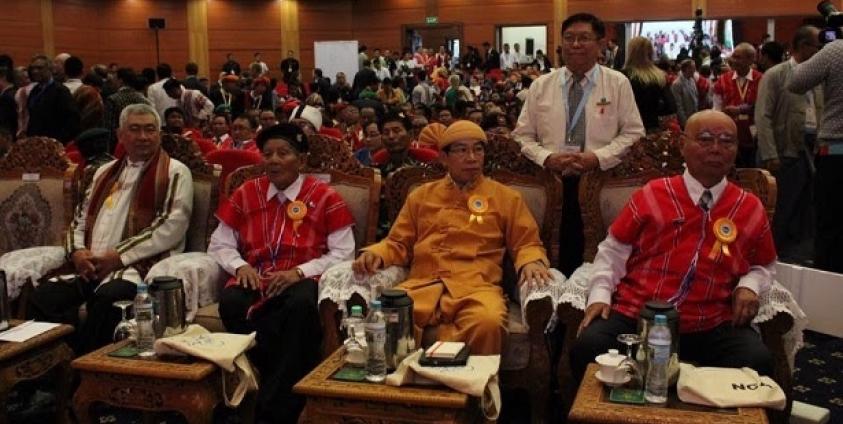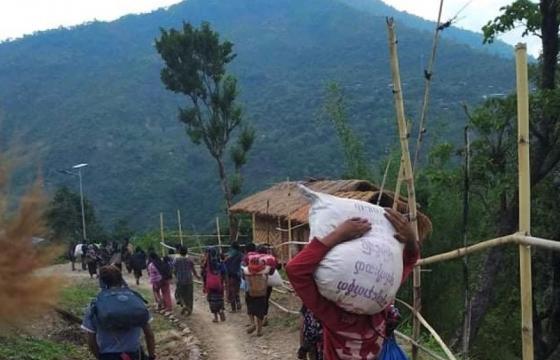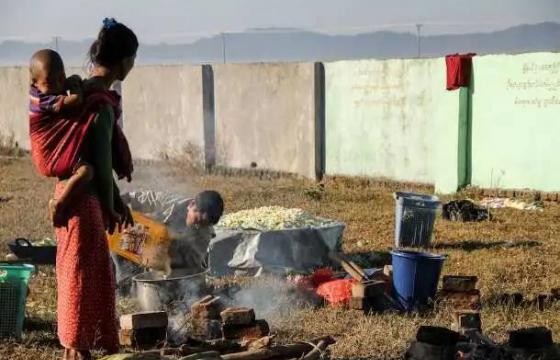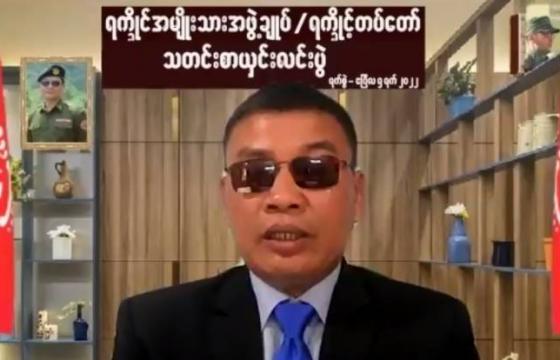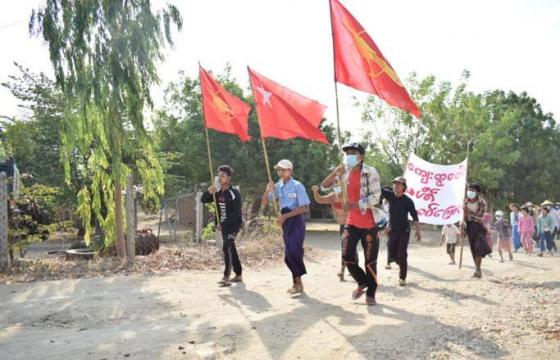Some inside information about what happened behind the scenes at the nationwide ceasefire agreement (NCA) signing ceremony by U Khun Sai.
He is a director of the Pyidaungsu Institute for Peace and Dialogue and also an adviser to the Restoration Council of Shan State/Shan State Army (RCSS/SSA), one of the eight ethnic armed organisations (EAOs) who signed the NCA on 15 October.
Since I wrote my last To Hopeland and Back journal, I’ve been in and out of Hopeland a couple of times, between Chiang Mai and Rangoon. Somehow I didn’t have time to write about them.
But then there came several questions about the ongoing peace process, which the mainstream media has done its best to answer but still a lot went unanswered. I hope this journal may be able to cover some of these questions, if not all.
Monday, 12 October 2015
“One wrong can move a people,
And a wronged people can move the world.”
From The Water Margin by David Weir
My arrival in Rangoon, an hour’s flight from Chiang Mai, coincides with the government announcement delisting—from the Unlawful Associations—three of the eight ethnic armed organizations (EAOs) that have agreed to sign the Nationwide Ceasefire Agreement (NCA): Karen National Union (KNU), Restoration Council of Shan State (RCSS) and All Burma Students Democratic Front (ABSDF), The Unlawful Associations Act (UAA) is a relic from the British colonialist days. No wonder there are people who say ‘rulers that continue to employ colonialist laws are themselves colonialists.’
On my way to the hotel, the taxi driver asks me where I came from. When I answer ‘Thailand,’ he asks again what the Thais think of Aung San Suu Kyi. I tell him many compare her to Thaksin Shinawatra, a popular political leader who was overthrown by the military in 2005. At the same time, there is some criticism that her government (if she wins November’s election) will face a lot of trouble, even without the military’s interference. Because unlike Thai parties such as Democrats, she doesn’t have a shadow government, assigning likely members as shadow ministers for different portfolios—not only to follow what’s happening in each ministry but also to plan for effective takeover if they get elected.
I’m a little fearful of how he might respond. But to my relief he is wonderfully big-hearted about it. “Still, I’m going to vote for her, because I don’t like the military.” I think he speaks for millions of voters in the country, particularly in the lowlands where Burmans are the dominant majority. But for those in the uplands, it’s another story.
As everyone, both representatives from EAOs and the Myanmar Peace Center (MPC), has gone to Naypyitaw at this point, I spend a quiet day meeting my childhood friends, most of whom are Burmans, to reminisce about the good old days gone by.
None of them, as I find out, are going to vote for the ruling party.
Tuesday, 13 October 2015
“Time is not an enemy to fight against.
Time is an ally to work with.”
From The Water Margin by David Weir
My first thought of the day is whether I should wait for the bus caravan that is due to leave from the MPC at 9:00 tomorrow. But then I’m urged to fly to Naypyitaw today, as Gen. Yawdserk, leader of the RCSS/SSA, is due to arrive there from Tachileik this evening. I, as an advisor to him, will be needed.
Fortunately, the hotel manages to obtain a ticket for the 14:30 flight. As Rangoon traffic is treacherously unpredictable, I decide to leave for the airport at 11:00. I’m lucky because the taxi driver manages to get me there a little after 12:00.
I kill my time reading Stratfor founder George Friedman’s The Next 100 Years. The plane is on time. So is its arrival an hour later in Naypyitaw.
An hour later, Sao Yawdserk and his entourage show up. Together we are escorted to a lavish hotel, Shwe San Ein (Golden Mansion), owned by U Tay Za.
After a brief update by Col. Sai La, who has been in Naypyitaw since October 11, we are shown to our rooms.
Some of the Thai journalists are quite impressed with President Thein Sein. Like him or not, you cannot deny that he has an easy, smooth and calm voice from which words flow out quite effortlessly. I ask one of them how he compares with our Nayok (Prime Minister) back home. She replies without hesitation: “The President’s better although I can’t understand a word he says.”
I spend the rest of the day talking to Dr. Sai Kham Leik and his lifelong ‘better half,’ Dr. Nwe Tin. Both of them are there at the invitation of U Aung Min, who is a great fan of Kham Leik’s songs.
One of the lines oft-quoted by him in relation to the prolonged NCA negotiations, which took almost two years to put signatures to, goes something like this:
Why is that people like to do it the hard way
When it is easy to do
Kham Leik says he has just written a new song “for peace.” He shows me the lyrics to read, and I fall in love with the title right away, which, roughly translated in English, means:
“Draw Equals Win-Win.”
Coming back to my room later, it occurs to me that I had not asked him to sing it.
Thursday, 15 October 2015
“A nation is good and strong,
When it lets ever more people live together in peace.
A nation is weak and wrong,
When it needs an army to fight against itself.”
From The Water Margin by David Weir
I don’t have much to say today for the signing ceremony as well as the opening ceremony for the Joint Implementation Coordination Meeting (JICM) which follows later, except for two things:
The first is to remark that some of the signatories on the government’s side–there are eight on each side, not counting the President—are not really happy about the whole affair. (Until today, the EAOs have yet to receive their copies of the NCA. I’m not sure if it has anything to do with the above-mentioned information I had received.)
What isn’t true is that the reason the Shan State Progress Party/Shan State Army (SSPP/SSA) is being attacked has something to do with its refusal to sign the NCA. Because others like the Mons and Karennis that have also been against signing it—as long as the government refuses to include the Kokang group—are being left untouched. Later I was told by an EAO leader that the real reason for the Burma Army’s attack, according to him, was to prevent the SSPP/SSA from signing the NCA. Had the SSPP/SSA agreed to sign, it would have thwarted the Burma Army’s plan to seize all positions west of the Salween, which altogether constitute a gateway to the Wa territory in the east.
The day is full with visits from diplomats. Many express their support for the RCSS/SSA decision to sign the NCA, despite the offensive from the Burma Army. “It takes great courage and long sightedness to do that,” one of them is quoted as saying.
They also say without the participation of the RCSS, the signing ceremony slated for tomorrow “could have been hollow.”
Wednesday, 14 October 2015
“Truth has a way of defending itself.
Only lies and cruelty need force of arms”
From The Water Margin by David Weir
U Tay Za, of course, is known as a crony, which means he is a businessman working in the interests of those in power. A mutual friend tells me he was at first upset about being called a crony. “But now he likes to introduce himself as Crony Tay Za,” she says.
At 7:00, U Aung Min, the government’s principal negotiator, comes to visit Sao Yawdserk. U Aung Min is bombarded with questions about why the Army has been attacking the RCSS/SSA’S brother movement, the Shan State Progress Party/Shan State Army (SSPP/SSA) since October 6.
U Aung Min’s reply is that the general elections security level has gone up to the top and that the SSPP/SSA’S alleged open support for a certain Shan party had not made the military authorities happy.
Of course, I doubt anybody present is buying that. Because since 2011, the Burma Army has been attacking the SSA positions west of the Salween, one after another, even though the latter has already signed state and union level ceasefire agreements.
Friday, 19 October 2015
“An Army should always be ready, but never be used.”
From The Art of War by Sun Tzu
Today is the first meeting of the JICM, presided over by Vice President Sai Mawk Kham who opens with the following statement:
“There may be unforeseeable difficulties lying ahead. Only by patience and forbearance can we overcome them.”
Not that the participants don’t know it, but it was good of him to remind us. He should know what he’s talking about, with him wearing longyis instead of Shan pants for over four years now. Even Sao Aung Myat, our President-appointed Shan State Chief Minister, wears the Shan costume on all public occasions.
During lunch, he goes around shaking our hands one after another. I try to exchange banter with him when he shakes mine, saying: “How does it feel to be freed of all these punishments?”
He is quick with his response:
“Why don’t you give it a try, if you want to know.”
Well, he should know I’m the last guy on earth to do it. It’s enough that my wife had selected me as her lifelong companion. I don’t entertain any burning ambitions further than that. I’m also happy being just an advisor for it carries no responsibilities too heavy for me.
One of the RCSS officers tells me later, “When we met yesterday [at the signing ceremony], he said, ‘let us all give it a try.’”
The day’s agenda is to nominate participants/members for the Joint Monitoring Committee (JMC) and Union Peace and Dialogue Joint Committee (UPDJC) and to consider the Terms of Reference (TOR) for them, in accordance with the NCA, Chapter 3.
It takes us some time and patience whether we should do the nominations first or the TORs first. I can understand it. The EAOs don’t have their Nationwide Ceasefire Coordinating Team (NCCT) or its later outgrowth, the Special Delegation (SD) anymore. Each of them is coming to the meeting as an individual organization, a shortcoming with they will need to correct as soon as possible.
One of the participants confides in me later, “Many a time, I thought I was going to have a nervous breakdown.”
A newcomer to the negotiations also remarks, “Now I know why it took so long to conclude the NCA.”
Clearly, making peace is quite different from making war. With the latter, you may need a lion’s heart, but with the former, you need nerves of steel.
The meeting ends at 17:00.

